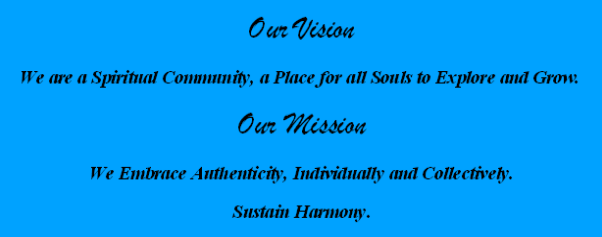UNITY CENTER of Des Moines CODE OF ETHICS
Ethics, Agreement, & Definitions

Unity Center of Des Moines exists to enhance the quality of spiritual life by engaging, supporting and providing resources to our community that are in alignment with the Vision and Mission of the Unity Center of Des Moines.
All participants, whether an individual or member on any organization which participates, leases or shares space, share a common vision and purpose to assist the Whole’s spiritual wellbeing and development through intellectual, emotional and physical lectures, activities, workshops, and experiences available. It is the intent of Unity Center to promote and support respect for human dignity and diversity while encouraging a free exchange of ideas and opinions.
Facilitators and leaders (*) as well as members of the center work in a variety of settings and serve in multiple capacities. Leadership at the center embodies a professional relationship that empowers diverse individuals, families, and groups to accomplish spiritual health, wholeness and evolution.
Being a facilitator, leader or teacher for another is one of the greatest honors and privileges bestowed upon one human being for another. It is a sacred duty of the facilitator or leader to hold the best interest of the member in mind in all interactions and be committed to the well-being and highest good for all concerned. The facilitator, leader or teacher must be mindful that there are lines that can be crossed which jeopardize the sacredness and purity of the relationship with a member. These include anything that interferes with or confuses the relationship, anything that causes harm to or a sense of insecurity in the any person or group.
All professions and associations have an obligation to articulate its basic values, ethical principles, and ethical standards. These Code of Ethics set forth the values, principles and standards to guide leaders and members’ conduct within their provision of care as Unity Center of Des Moines facilitators and leaders. This code is relevant to all members regardless of their professional functions, the settings in which they work, or the populations they serve, or the services they engage or participate in.
*For simplification “facilitators and leaders” will refer to leader, service provider, coach, teacher, minister, counselor or supervisor and “member” will refer to student, congregant, member or client of Unity Center
In addition, all credentialed and non-credentialed leaders serving in the capacity of a credentialed Unity leader must adhere to:
- Unity Worldwide Ministry Code of Ethics (unityworldwideministries.org/codes-ethics)
- Sexual Conduct Policy (unityworldwideministries.org/sexual-conduct-policy)
The Unity Center desire is to enhance human well-being by providing care to persons in physical, mental, spiritual, emotional, or social need in diverse settings. “Persons” is used inclusively to refer to individuals, families groups, organizations, and communities. Spiritual care is defined here as the focus on individual spiritual wellbeing as well as within a social context of participation in community and society. Fundamental to spiritual care is attention to the issues of spiritual strength and distress that create, contribute to, and address challenges and joys in living as it is essential to each person’s experience of health, wholeness, and meaning in life.
Unity Center leaders and facilitators seek to enhance the capacity of persons to identify and utilize their spiritual, religious and existential strengths, assist in accommodating practices when appropriate, and providing resources that harmonize with the value and mission of Unity Center. They also seek to promote and advocate for the responsiveness of health care and other organizations, communities, and social institutions in acknowledging and incorporating the spiritual dimension of persons in the services they provide.
Unity Center Professionals and Leaders are grounded in communities of diverse faiths and spiritual practices. They are informed by professional education, training and personal and professional experiences. They are called to nurture their personal health of mind, body and spirit and be responsible for their personal and professional conduct as they grow in their respect for all living beings and the natural environment. When Unity Center Professionals and Leaders behave in a manner congruent with the values of this code of ethics, they bring greater justice, compassion and healing to our world.
Unity Center Professionals and Leaders:
- affirm the dignity and value of each individual
- respect the right of each faith group to hold to its values and traditions
- advocate for professional accountability that protects the public and advances the profession
- respect the cultural, ethnic, gender, racial, sexual-orientation, and religious diversity of other professionals and those served and strive to eliminate discrimination
Dignity of and respect for the person:
- Unity Center facilitators and leaders are sensitive to spiritual, religious, existential, cultural, ethnic, racial, sexual-orientation and other expressions of diversity and affirm the dignity and value of each individual. Spiritual care providers strive to eliminate discrimination in all its forms and expressions.
Competence:
- Unity Center facilitators and leaders who incorporate spiritual care into their practice are informed by professional education, knowledge, training, and demonstration of competence. They practice within their scope of practice and continually develop and enhance their professional expertise.
Integrity:
- Unity Center facilitators and leaders behave in a trustworthy manner. They act honestly and responsibly both individually and as members of the organizations with which they are affiliated and employed.
Importance of human relationships:
- Unity Center facilitators and leaders understand that relationships between and among people are important to personal and communal strength, support, and growth. They seek to engage persons as partners in the provision of spiritual care to address their challenges, joys, and needs. They seek to resolve conflicts and promote effective communication and understanding.
The Unity Center promotes spiritual care as integral to the care, respect, and dignity of all persons. Its commitment to its members is the advocacy of the spiritual growth and healing, provision of knowledge and education, demonstration of competency, and commitment to quality improvement and research. All members and supporters of Unity Center will be treated with dignity, respect, and collegiality without discrimination
These Ethical Standards are explained in more detail in the Ethical Standards for Unity Center Facilitators and Leaders available on the Unity Center website (unitydesmoines.com) and include detailed explanation of the following concepts:
1. Ethical Responsibilities to Persons Unity Center facilitators and leaders understand persons to be any clients, patients, counselees, members of a faith/spiritual/cultural community, family members, staff, or students to whom they provide spiritual care. Unity Center facilitators and leaders uphold the standards of professional ethics as outlined in the Ethical Standards for Unity Center Facilitators and Leaders
2. Ethical Responsibilities to Colleagues Unity Center facilitators and leaders engage in collegial relationships with peers including other Unity Center facilitators and leaders, community religious, spiritual, and existential belief system leaders, cultural community elders and leaders, and those from other professional disciplines.
3. Ethical Responsibilities in Education Those who function as educators, field instructors for students, or trainers of other professionals should provide instruction only within their areas of knowledge and competence and should provide instruction based on the most current information and knowledge available in the profession.
4. Ethical Responsibilities in Research Unity Center facilitators and leaders promote and engage in research to contribute to the development of knowledge and best practices within their profession.
5. Ethical Responsibilities to Unity Center.
Unity Center facilitators and leaders who participate in Unity Center, whether a leader, student or member of organizations serving within Unity Center, commit to integrity, competence, respect, and collegiality as defined by the Code of Ethics.
The Unity Center Code of Ethics was adapted from leading spiritual care communities Code of Ethics as follows:
- Code of Ethics - Spiritual Care Association (spiritualcareassociation.org/code-of-ethics.html)
- Code of Ethics - American Counseling Association. 2014 (counseling.org/docs/default-source/default-document-library/2014-code-of-ethics-finaladdress.pdf)
- Common Code of Ethics for Chaplains, Pastoral Counselors, Pastoral Educators and Students (professionalchaplains.org/files/professional_standards/common_standards/common_cod e_ethics.pdf)
- Unity World Wide Ministry Code of Ethics (unityworldwideministries.org/codes-ethics)
- Sexual Conduct Policy (unityworldwideministries.org/sexual-conduct-policy).
